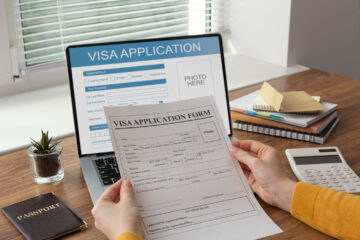Visa and Work Permit Solutions for Thai SMEs: Rules, Procedures, and Best Practices
Attracting and retaining global talent is essential for many Thai small to medium-sized enterprises (SMEs) to remain competitive, innovative, and adaptable. This often involves hiring foreign nationals, which in turn necessitates securing the appropriate visas and work permits. Given the complexities and myriad regulations governing this process, a comprehensive understanding of the rules, procedures, and best practices is crucial for Thai SME owners seeking to employ foreign workers legally and efficiently.
This guide aims to illustrate the requirements and procedures for obtaining visas and work permits for SMEs in Thailand, delving into the different visa and work permit types and offering insights into the application process and potential pitfalls. Furthermore, we will showcase how Plizz’s professional services can seamlessly support Thai SMEs with visa and work permit solutions, enabling a more diverse workforce and a business better poised for success.
By equipping yourself with the knowledge contained in this guide and partnering with Plizz for your visa and work permit needs, Thai SMEs can confidently navigate the complexities of employing foreign nationals, bolster their workforce diversity, and drive their businesses towards greater innovation and success.
Understanding Visa and Work Permit Requirements for Thai SMEs
Before delving into the application process, it is essential to understand the different types of visas and work permits available for foreign nationals employed by Thai SMEs:
1. Non-Immigrant B Visa: This visa category is applicable for foreign nationals employed by a Thai business or a foreign-owned business operating in Thailand, including SMEs. The Non-Immigrant B Visa needs to be obtained before entering the country, and the initial duration of stay is 90 days, which can be extended to one year upon obtaining a work permit.
2. Work Permit: A Thai work permit is required for foreign nationals working in Thailand, even if they have a Non-Immigrant B Visa. The work permit is tied to a specific employer and job position, so a new permit or an amendment to the existing permit is required if there is a change in the job or employer.
By understanding the different visa and work permit categories, Thai SME owners can better navigate the application process and ensure their foreign employees have the appropriate documentation.
Obtaining Visas and Work Permits: The Step-by-Step Process
Navigating the visa and work permit application process can be complex. Here is a step-by-step guide for Thai SMEs seeking to employ foreign nationals:
1. Job Offer and Documentation: Before applying for a visa, the foreign national should receive a formal job offer from the Thai SME. The employer will provide the supporting documents required for the visa application, such as company registration documents, financial statements, and a list of current employees.
2. Non-Immigrant B Visa Application: The foreign national must apply for a Non-Immigrant B Visa at a Royal Thai Embassy or Consulate in their home country or country of residence. The application will include the submission of a visa application form, passport, recent photographs, and supporting documents from the employer. Once the visa is approved and issued, the foreign national can enter Thailand.
3. Work Permit Application: Upon arrival in Thailand, the SME must apply for a work permit on behalf of the foreign employee at the local Office of Foreign Workers Administration. The application should include forms and supporting documents from both the employer and the employee, along with a government fee.
4. Work Permit Issuance: If the work permit application is approved, the foreign national will receive a work permit booklet with their details, job position, and employer information. The work permit grants the foreign national the legal right to work in Thailand, and the one-year stay extension can be applied for at the Immigration Bureau.
By following this detailed process, Thai SMEs can ensure successful visa and work permit applications and maintain compliance with Thai regulations.
Best Practices for Visa and Work Permit Management in Thai SMEs
Managing visas and work permits involves ongoing effort and vigilance from Thai SMEs, and the following best practices can help businesses maintain compliance and a productive work environment:
1. Maintain Accurate Records: Keep updated records of all foreign employees, including their visa and work permit details, job roles, and contact information. This can be particularly helpful during audits or in the event of changes to job positions.
2. Monitor Visa and Work Permit Expirations: Keep track of visa and work permit expiration dates to ensure timely renewals, avoiding fines and penalties, as well as interruptions in the employee’s work status.
3. Stay Informed on Regulatory Changes: Be proactive in understanding any changes to Thai visa and work permit regulations, ensuring ongoing compliance and developing strategies to adapt to new requirements.
4. Leverage Expert Support: Partner with a professional service provider like Plizz to simplify the visa and work permit application and management process, freeing up time and resources for the SME to focus on core business activities.
How Plizz Can Assist with Visa and Work Permit Solutions for Thai SMEs
Plizz offers a range of services to help Thai SMEs navigate the complexities of visa and work permit applications, renewals, and ongoing management:
1. Expert Guidance: Plizz’s skilled professionals are well-versed in Thai visa and work permit regulations, offering invaluable advice and ensuring successful application outcomes.
2. Streamlined Application Process: Plizz can help prepare the necessary documentation, manage the application process, and liaise with government officials on behalf of the SME, simplifying the entire experience.
3. Ongoing Compliance Support: Plizz offers ongoing support for Thai SMEs to maintain visa and work permit compliance, monitoring expiration dates, and guiding businesses through the renewal process.
By partnering with Plizz, Thai SMEs can access expert guidance and streamlined solutions to ensure a diverse workforce and compliance with all visa and work permit requirements.
Master Visa and Work Permit Solutions with Plizz’s Expert Support
Navigating the complexities of visas and work permits for foreign employees is essential for Thai SMEs seeking to attract global talent and remain competitive. Through a comprehensive understanding of regulations, procedures, and best practices, and with the support of Plizz’s expert solutions, Thai SMEs can maintain a diverse workforce and ensure ongoing compliance with Thai regulations.
Experience the benefits of Plizz’s professional visa and work permit solutions, helping your Thai SME remain compliant, attract global talent, and drive the business towards growth and success.
Rely on Plizz’s expertise for all your Thai SME’s visa and work permit requirements, ensuring a diverse and compliant workforce ready to propel your business to new heights.



0 Comments